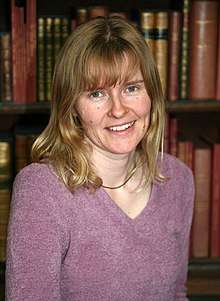Judith Driscoll
| Prof. Judith Driscoll FREng FInstP | |
|---|---|
 | |
| Alma mater | Imperial College London |
| Awards |
IoP Joule Medal and Prize |
| Scientific career | |
| Fields | Materials Science |
| Institutions |
University of Cambridge |
| Website | https://driscoll.msm.cam.ac.uk/ |
Judith MacManus-Driscoll FREng is a Professor of Materials Science at the University of Cambridge. Her research is concerned with the nanoscale design and tuning of functional oxide thin film materials for a variety of energy applications for generation, transmission, storage and harvesting.[1] She is a Fellow of the Institute of Physics, Institute of Materials, Minerals and Mining, Materials Research Society and American Physical Society.
Early life and education
Driscoll studied materials science at Imperial College London.[2] She was awarded the Governor's Prize for highest academic achievement in 1987.[3] She completed a PhD in high-temperature superconductivity at the University of Cambridge.[2] She was an IBM Postdoctoral Fellow from 1991-1995 working at Stanford University with Prof. Theodore Geballe, Prof. John Bravman, and with Dr. Robert Beyers at IBM Almaden Research Center.
Research and career
In 1991 Driscoll joined the IBM Almaden Research Center.[4] She joined Imperial College London as a lecturer in the Department of Materials, where she was promoted to reader in 1999.[4] She joined the University of Cambridge in 2003 before taking a sabbatical to work at Los Alamos National Laboratory.[4] She is still a visiting researcher as Los Alamos National Laboratory. She returned to Cambridge in 2003 and was promoted to Professor in 2008.[4] She was the first woman to be Professor in the University's Department of Materials Science and Metallurgy, as well as being the first woman to be Professor in Natural Sciences at Trinity College, Cambridge.[5]
Driscoll studied high-temperature superconducting films of yttrium barium copper oxide, using nanoparticles to improve flux pinning.[6] These worked by introducing perfectly sized defects in the superconductor.[2][7] Driscoll studied high-temperature superconducting films of yttrium barium copper oxide, using nanoparticles to improve flux pinning. These worked by introducing perfectly sized defects in the superconductor. Her method has been adopted widely by industry. She also proposed and demonstrated a new way[8] to fabricate high temperature superconductors much more rapidly which paved the way for a new industry process.[9]
She identified the route to minimising leakage in Bismuth ferrite films,[6] and was the first person to show strain switching and spontaneous ordering in heteroepitaxial oxide films.[6] Driscoll pioneered vertically aligned nanocomposite films[10], leading to many advanced functionalities, e.g. high performance memristors[11] and nanoionic devices[12].
Driscoll is founding editor-in-chief of American Institute of Physics's APL Materials Journal.[13][14] She is a governor at St Mary's School, Cambridge.[5] She has several patents relating to high-temperature superconductivity.[15] She is working to improve diversity in the physical sciences.[16] She was made a Fellow of the Institute of Physics in 2002, of the American Physical Society in 2012, the Materials Research Society in 2015,[3] and the Royal Academy of Engineering in 2018.[17]
Honours and awards
- 2015 Institute of Physics Joule Medal and Prize[6]
- 2015 Royal Academy of Engineering Armourers and Brasiers' Company Prize[18]
- 2017 Institute of Electrical and Electronics Engineers James Wong Award[19]
- 2018 Institute of Materials, Minerals and Mining Kroll Prize[20]
References
- ↑ "Professor Judith L MacManus-Driscoll — Driscoll Research Group". driscoll.msm.cam.ac.uk. Retrieved 2018-06-07.
- 1 2 3 "Nanotechnology may be tiny but its potential is huge". The Telegraph. 2016-09-30. ISSN 0307-1235. Retrieved 2018-06-07.
- 1 2 "Prof. Judith Louise Driscoll - AcademiaNet". www.academia-net.org. Retrieved 2018-06-07.
- 1 2 3 4 D.,, Madsen, Lynnette. Successful women ceramic and glass scientists and engineers : 100 inspirational profiles. Hoboken, New Jersey. ISBN 9781118733592. OCLC 929332211.
- 1 2 "Our governors". www.stmaryscambridge.co.uk. Retrieved 2018-06-07.
- 1 2 3 4 Physics, Institute of. "2015 Joule Medal and Prize". www.iop.org. Retrieved 2018-06-07.
- ↑ "Grant winners". Times Higher Education (THE). 2010-03-04. Retrieved 2018-06-07.
- ↑ "Phase equilibria in the YBCuO system and melt processing of Ag clad Y1Ba2Cu3O7−x tapes at reduced oxygen partial pressures". Physica C: Superconductivity. Retrieved 7 October 2018.
- ↑ "Strong pinning in very fast grown reactive co-evaporated GdBa2Cu3O7 coated conductors". APL Materials. APL.
- ↑ "Self‐Assembled Heteroepitaxial Oxide Nanocomposite Thin Film Structures: Designing Interface‐Induced Functionality in Electronic Materials". Advanced Functional Materials. Wiley Online Library. Retrieved 8 October 2018.
- ↑ "Self-assembled oxide films with tailored nanoscale ionic and electronic channels for controlled resistive switching". Nature Communications. Retrieved 8 October 2018.
- ↑ "Strongly enhanced oxygen ion transport through samarium-doped CeO2 nanopillars in nanocomposite films". Nature Communications. Retrieved 8 October 2018.
- ↑ AIP Publishing (2013-03-22), Introducing APL Materials — a new open access journal in functional materials science, retrieved 2018-06-07
- ↑ AIP Publishing (2014-06-26), APL Materials Update, retrieved 2018-06-07
- ↑ "Judith Macmanus-Driscoll Inventions, Patents and Patent Applications - Justia Patents Search". patents.justia.com. Retrieved 2018-06-07.
- ↑ AIP Publishing (2016-03-30), Q&A: Judith Driscoll Discusses Her Top Scientific Accomplishments, retrieved 2018-06-07
- ↑ "50 engineering leaders become Fellows of the Royal Academy of Engineering". Retrieved 21 September 2018.
- ↑ "University of Cambridge materials engineer wins Royal Academy of Engineering Armourers and Brasiers Company Prize 2015". www.raeng.org.uk. RAEng. Retrieved 8 October 2018.
- ↑ "The IEEE Dr. James Wong Award for Continuing and Significant Contributions to Applied Superconductivity Materials Technology to be presented to Judith Louise MacManus-Driscoll | IEEE Council on Superconductivity". ieeecsc.org. Retrieved 2018-06-07.
- ↑ "IOM3 Awards 2018 | IOM3". www.iom3.org. Retrieved 2018-06-07.